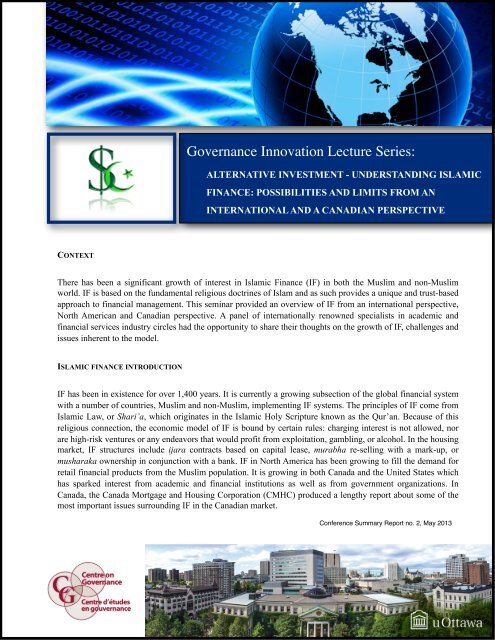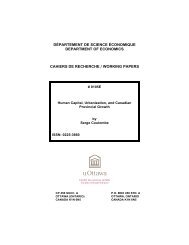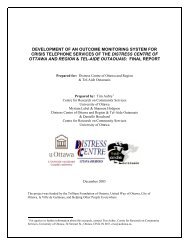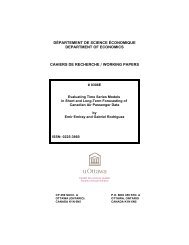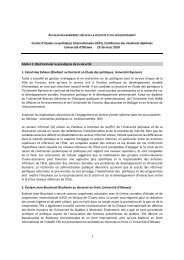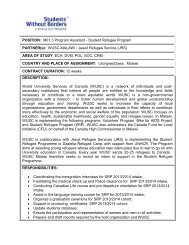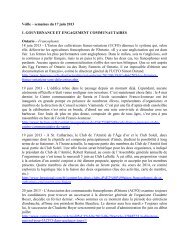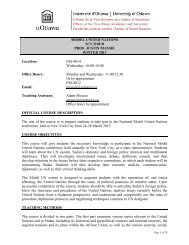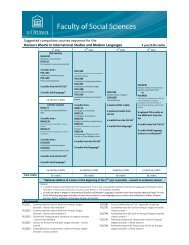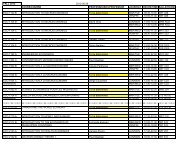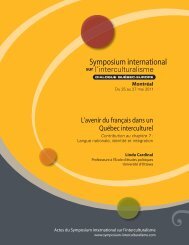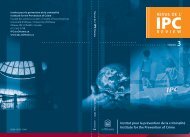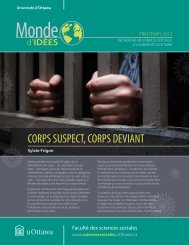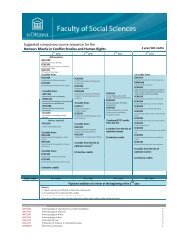Conference Summary Report - Faculty of Social Sciences ...
Conference Summary Report - Faculty of Social Sciences ...
Conference Summary Report - Faculty of Social Sciences ...
Create successful ePaper yourself
Turn your PDF publications into a flip-book with our unique Google optimized e-Paper software.
! ! 1<br />
Governance Innovation Lecture Series:<br />
ALTERNATIVE INVESTMENT - UNDERSTANDING ISLAMIC<br />
FINANCE: POSSIBILITIES AND LIMITS FROM AN<br />
INTERNATIONAL AND A CANADIAN PERSPECTIVE<br />
CONTEXT<br />
There has been a significant growth <strong>of</strong> interest in Islamic Finance (IF) in both the Muslim and non-Muslim<br />
world. IF is based on the fundamental religious doctrines <strong>of</strong> Islam and as such provides a unique and trust-based<br />
approach to financial management. This seminar provided an overview <strong>of</strong> IF from an international perspective,<br />
North American and Canadian perspective. A panel <strong>of</strong> internationally renowned specialists in academic and<br />
financial services industry circles had the opportunity to share their thoughts on the growth <strong>of</strong> IF, challenges and<br />
issues inherent to the model.<br />
ISLAMIC FINANCE INTRODUCTION<br />
IF has been in existence for over 1,400 years. It is currently a growing subsection <strong>of</strong> the global financial system<br />
with a number <strong>of</strong> countries, Muslim and non-Muslim, implementing IF systems. The principles <strong>of</strong> IF come from<br />
Islamic Law, or Shari’a, which originates in the Islamic Holy Scripture known as the Qur’an. Because <strong>of</strong> this<br />
religious connection, the economic model <strong>of</strong> IF is bound by certain rules: charging interest is not allowed, nor<br />
are high-risk ventures or any endeavors that would pr<strong>of</strong>it from exploitation, gambling, or alcohol. In the housing<br />
market, IF structures include ijara contracts based on capital lease, murabha re-selling with a mark-up, or<br />
musharaka ownership in conjunction with a bank. IF in North America has been growing to fill the demand for<br />
retail financial products from the Muslim population. It is growing in both Canada and the United States which<br />
has sparked interest from academic and financial institutions as well as from government organizations. In<br />
Canada, the Canada Mortgage and Housing Corporation (CMHC) produced a lengthy report about some <strong>of</strong> the<br />
most important issues surrounding IF in the Canadian market.<br />
<strong>Conference</strong> <strong>Summary</strong> <strong>Report</strong> no. 2, May 2013
! ! 2<br />
CMHC REPORT<br />
The CMHC commissioned Gowlings, a Canadian Law Firm for Business and Commerce, to produce a report in<br />
order to provide additional insight concerning the adaptability <strong>of</strong> IF in the Canadian retail financial market. This<br />
document included information specifying some <strong>of</strong> the principles <strong>of</strong> IF, including prohibition <strong>of</strong> interest,<br />
transparency, and decision making in accordance with Islamic law. In addition to noting some <strong>of</strong> the<br />
implications stemming from Shari’a, the report included case studies <strong>of</strong> IF applications in countries such as the<br />
United Kingdom and Australia.<br />
According to CMHC, IF exists in the Canadian marketplace. While Shari’a Law does not necessarily<br />
contravene relevant Canadian laws, it does introduce new and additional legal considerations. For example,<br />
there are property standards, environmental impact assessments, and liability for the payment <strong>of</strong> taxes<br />
considerations. The CMHC report concludes that a significant amount <strong>of</strong> additional research in the area <strong>of</strong> IF is<br />
required in order to produce a more thorough picture <strong>of</strong> the feasibility <strong>of</strong> implementation in the Canadian<br />
financial system.<br />
ALTERNATIVE INVESTMENTS: ISLAMIC FINACE IN AN INTERNATIONAL, NORTH AMERICAN AND CANADIAN<br />
CONTEXT<br />
On March 14, 2013, three prominent pr<strong>of</strong>essionals with deep knowledge <strong>of</strong> a rapidly growing subsection <strong>of</strong> the<br />
global financial system presented their work on IF at the University <strong>of</strong> Ottawa.<br />
Dr. Mahmoud Mohieldin provided a clear picture <strong>of</strong> the potential <strong>of</strong> IF and where it is today. Dr. Mohieldin is an<br />
executive at the World Bank Group having served as a Managing Director, and is currently the Special Envoy to<br />
the President for the Millennium Development Goals. Prior to joining the World Bank, Mr. Mohieldin held<br />
numerous positions in the Government <strong>of</strong> Egypt. He was a member <strong>of</strong> the Commission on Growth and<br />
Development. He served as Board Member <strong>of</strong> several universities, regional research centers and think tanks. As<br />
a Pr<strong>of</strong>essor <strong>of</strong> Economics, he has authored numerous publications and articles in leading economic journals.
! ! 3<br />
Two discussants supported Dr. Mohieldin’s presentation. Rehan Huda presented on IF in a North American<br />
context. Mr. Huda is currently a founder and Director <strong>of</strong> Amana Canada Holdings, a firm specializing in<br />
structuring IF products and services for the Canadian marketplace as well as for Middle East investors. Rehan<br />
has been a guest speaker on Islamic Economics and Finance at a variety <strong>of</strong> international conferences and<br />
universities and has been interviewed by leading media outlets in Canada and abroad. He also assisted in<br />
initiating and teaching the first MBA course in IF at a North American university, the Rotman School <strong>of</strong><br />
Business at the University <strong>of</strong> Toronto.<br />
Walid Hejazi, an Associate Pr<strong>of</strong>essor <strong>of</strong> Business Economics, and Academic Director, at the Rotman School <strong>of</strong><br />
Management, completed the seminar by explaining what IF looks like in the Canadian context. Dr. Hejazi<br />
teaches Canada’s current and future business leaders in the MBA, EMBA, and custom Executive programs. Mr.<br />
Hejazi has also developed a successful course in Islamic Finance, which is a for credit course in the MBA<br />
program at the University <strong>of</strong> Toronto. This represents the first such course in Canada. He has published<br />
extensively in many business journals and publications.<br />
From left to right:<br />
Dr. Walid Hejazi,<br />
Dr. Mahmoud Mohieldin,<br />
Rehan Huda
! ! 4<br />
DR. MAHMOUD MOHIELDIN, SPECIAL ENVOY TO PRESIDENT – WORLD BANK GROUP<br />
Dr. Mahmoud Mohieldin<br />
answering a question from the audience<br />
Dr. Mahmoud Mohieldin was the main speaker at the<br />
Seminar on IF hosted at the University <strong>of</strong> Ottawa. He based<br />
his presentation on the paper he published in 2012 entitled<br />
“Realizing the Potential <strong>of</strong> Islamic Finance”. The<br />
presentation included a comprehensive explanation <strong>of</strong> IF, a<br />
subsection <strong>of</strong> the global financial system. There was also an<br />
elaboration <strong>of</strong> the contrast and relation <strong>of</strong> IF to the so called<br />
“conventional financial system”. He continued with the<br />
performance <strong>of</strong> IF as well as challenges the industry is<br />
facing today. It is difficult to discuss any significant topic<br />
involving finance in present day without mention <strong>of</strong> the<br />
Global Financial Crisis <strong>of</strong> 2008. This was where Dr.<br />
Mohieldin’s discussion began. His opening slides include a<br />
snapshot <strong>of</strong> global capital markets highlighting the collapse<br />
in 2008 due to the problems associated with Lehman<br />
Brothers and beyond. He built on this the idea <strong>of</strong> boom and<br />
bust cycles in the economy accepted by most academics as a<br />
by-product <strong>of</strong> Western capitalist systems referring to this<br />
phenomenon as a “negative feedback loop”. We see firms<br />
leveraging causing the economy to grow and bubble in<br />
certain industries. Once these bubbles burst, prices and<br />
pr<strong>of</strong>its fall causing firms to reduce their workforce and<br />
therefore increase the cost <strong>of</strong> capital and moral hazard.<br />
The World Bank Global Financial Development <strong>Report</strong> <strong>of</strong> 2013 evaluates the usefulness <strong>of</strong> the financial sector<br />
based on debt, access, efficiency and stability. The report found that weak supervision and regulation were<br />
endemic to the conventional global financial system and that the 2008 financial crisis emerged due to lack <strong>of</strong><br />
regulation and less than efficient market conditions. The report found that the system performed poorly prior to<br />
the financial crisis and even more poorly post-financial crisis. It was mandatory to revise the regulatory<br />
framework and to evaluate the role <strong>of</strong> the state in the relation to the financial sector. One <strong>of</strong> the conclusions<br />
coming out <strong>of</strong> this report is the need to take a look at different ways <strong>of</strong> doing things. IF could complement or<br />
provide an alternative to the conventional financial system.
! ! 5<br />
Dr. Mohieldin acknowledges that IF currently accounts for only 0.1 to 0.5 percent <strong>of</strong> the total financial assets in<br />
the global economy; however, he refers to the work for two prominent economists, Umer Chapra (2008) and<br />
Kenneth Rog<strong>of</strong>f, to explain that it is not the size <strong>of</strong> the industry that counts it is the quality. IF can provide a<br />
financial system that is based on something different than the conventional financial system. There may be<br />
lessons learned from something different. For example, the idea advanced by Robert Shiller from Yale<br />
University which would tie bond performance to the performance <strong>of</strong> the economy. These bonds would pay more<br />
when a country’s economy is growing and less when it is in recession. These points provide the transition from<br />
discussing the conventional financial system and the 2008 financial crisis toward IF.<br />
At its core, IF provides a better control over business cycle fluctuation by tying financial transactions to the real<br />
economy. It also reduces the private and net public debt and eliminates bank runs. These are achieved by<br />
requiring 100% reserves banking. As can be seen by the graph below, Islamic Banks performed much better<br />
during the financial crisis than did conventional banks. One <strong>of</strong> the main reasons for this is the following<br />
defining characteristics <strong>of</strong> IF. One, it prevents riba, defined as any kind <strong>of</strong> acceptance <strong>of</strong> predetermined interest<br />
rates on debt. It takes away debt securities from the financial system. Two, it takes away gharar, uncertainty<br />
from contracts. There can be no ambiguity in the agreement. As Dr. Mohieldin eloquently stated, “only sell what<br />
you have, and cannot try to sell what you don’t”. The final requirements are not linked to performance, IF does<br />
not permit investment into industries which are considered haram, forbidden by Islamic Law, including firms<br />
which sell arms, tobacco, alcohol, pornography and pork.<br />
Stock return %<br />
-40 -20 0 20 40<br />
Crisis Recovery<br />
2005q1 2006q1 2007q1 2008q1 2009q1 2010q1<br />
Islamic banks<br />
Conventional banks<br />
uOttawa
! ! 6<br />
If IF has an equivalent in the conventional financial system, it would be equity finance where both parties share<br />
in the pr<strong>of</strong>its; however, they would also share in losses. Dr. Mohieldin explained that there is no finance for the<br />
sake <strong>of</strong> finance. All transactions are linked to the real economy. There is a need for either an agricultural,<br />
industrial, or commercial activity behind the transaction. Of note, there are some discrepancies between theory<br />
and practice. IF includes the principles <strong>of</strong> property rights, Corporate <strong>Social</strong> Responsibility and human rights<br />
when dealing within the IF system. There is also an advocacy <strong>of</strong> risk and rewards to be distributed equally<br />
among the parties.<br />
What does IF look like today? Shari’a compliant assets have more than doubled since 2006 and the industry<br />
continues to grow. It is a 1.1 trillion dollar industry comprising banking assets, sukuk (Islamic bonds) and assets<br />
under management. The majority <strong>of</strong> these assets are in Malaysia (63%), United Arab Emirates (16%) and Saudi<br />
Arabia (8%). Emphasis is placed on economic growth accompanies by social justice ensuring that lower class<br />
individuals have access to micr<strong>of</strong>inance deposits and loans. Additionally, importance is given to redistribution <strong>of</strong><br />
wealth. There has been an increase in the quantity and quality <strong>of</strong> IF services especially in the Gulf aided by the<br />
commodity boom leading to these countries having surplus capacity and liquidity. They have <strong>of</strong>fered IF<br />
windows not only to Muslim clients, but also to non-Muslims clients seeking safe and quality investments.<br />
However, the picture is not all without challenges.<br />
Dr. Mohieldin explains that there are five major challenges. One, the regulatory framework may not be<br />
conducive to easily integrate the IF system. The system at times needs to comply with two sets <strong>of</strong> regulation<br />
making it more expensive and inefficient. Some counties have decided to move forward with a dual-regulatory<br />
approach having one set <strong>of</strong> rules for the conventional banking system, and another for the IF system. Two, there<br />
is a need to look at the tax regime within countries. Some IF windows undergo double taxation because <strong>of</strong> the<br />
nature <strong>of</strong> the product or services. Some countries have started to address this problem. Three, there are issues<br />
surrounding insolvency. There is a need to work on insolvency rules with special adaptation for the IF system.<br />
Four, being a new industry, there are issues surrounding standardization with a number <strong>of</strong> countries trying to<br />
establish their institutions as the producer <strong>of</strong> the international standards for the industry. Finally, there is a need<br />
to establishing sound liquidity and risk-management practices. This means ensuring that compliance with Basel<br />
III rules and liquidity risk management are addressed.<br />
Dr. Mohieldin completed his presentation by highlighting the role <strong>of</strong> The World Bank and their work with IF.<br />
There is knowledge sharing with the Islamic Development Bank, Islamic Financial Service Board (IFSB),<br />
Accounting and Auditing Organization for Islamic Financial Institutions (AAOIFI). They also collaborate with<br />
the following research centers: INCIEF, Oxford Center for Islamic Studies, and Harvard Islamic Finance<br />
Project.
! ! 7<br />
REHAN HUDA, DIRECTOR OF AMANA CANADA HOLDINGS<br />
Mr. Rehan Huda provided additional information on IF and set the context <strong>of</strong> the industry in North America by<br />
providing the audience with a historical snapshot <strong>of</strong> its introduction and development. IF was brought to the<br />
American market during the 1970s as firms especially energy-related ones, formed stronger relationships with<br />
firms in the Middle East. He continued by stating that while IF is today adapted to a modern context, its origins<br />
in Islamic tradition and theology have important connections with modern North American economic principles.<br />
In North America and Europe, there have been small-scale experiments with IF with mixed results. Mr. Huda<br />
pointed out that there are three Islamic funds in the United States including one in Michigan, another in<br />
Chicago, and a third in California. IF mortgage contracts have received approval from US regulators, which led<br />
to a new Islamic mortgage market that was picked up by Fannie May and Freddie Mac in the early 2000s.<br />
During the sub-prime mortgage crisis which followed, IF mortgages proved to be significantly more secure<br />
because <strong>of</strong> the IF principal <strong>of</strong> transparency prevented the approval <strong>of</strong> high-risk mortgages. He concluded by<br />
stating that performance <strong>of</strong> IF was equally strong during the entirety <strong>of</strong> 2008 Financial Crisis, which showed the<br />
resilience behind an economic model that places significant value on transparency and the effective<br />
management <strong>of</strong> risk.<br />
DR. HEJAZI, ASSOCIATE PROFESSOR AT THE ROTMAN SCHOOL OF MANAGEMENT, UNIVERSITY OF TORONTO<br />
Dr. Walid Hejazi was intent on changing people’s perception <strong>of</strong> the Middle East. He provided insight by<br />
transmitting that given the changing nature <strong>of</strong> the global economy, it is important to consider the growth <strong>of</strong><br />
Chinese and Middle Eastern financial markets. He continued by stating that Canada is pursuing increased<br />
foreign investment (FDI). He was adamant that Canada needed FDI period, and that the countries in the<br />
Cooperation Council <strong>of</strong> Arab States <strong>of</strong> the Gulf (GCC) would make complementary partners considering they<br />
have over a trillion dollars in excess liquidity. He stated that during the 2008 Financial Crisis, Shari’a compliant<br />
institutions performed better than their non-Shari’a counterparts. The strength <strong>of</strong> IF following the crisis sparked<br />
new interest in this economic model, and Canada’s strong reputation in the Gulf solidifies its place as an ideal<br />
trading partner. In order to capitalize on this foreign investment, there is a need for Canadians to become better<br />
aware <strong>of</strong> IF. Misconceptions surrounding democracy in the Middle East may hinder opportunities to do<br />
business; however, statistics indicate that many Gulf firms have corporate governance structures which perform<br />
at par with Western ones. He referred to a number <strong>of</strong> graphs to prove his point.
! ! 8<br />
CONCLUSION<br />
As was demonstrated by Dr. Mohieldin, Dr. Hejazi and Mr. Huda, there are differences between IF and the so<br />
called “conventional” financial system. They also painted a picture where both systems can be reconciled. With<br />
165 academics, financial services pr<strong>of</strong>essionals, public servants and students in attendance for the seminar, there<br />
is interest in exploring the possibilities <strong>of</strong> this industry in Canada. As highlighted by the speakers, the process <strong>of</strong><br />
integrating an IF system into a Western capitalist system poses some challenges. The United Kingdom and the<br />
United States implemented an IF system by changing their regulatory and taxation systems. This will be no<br />
different for Canadians if they chose to follow suit. It will also be important to differentiate between a need<br />
among the Canadian Muslim community for Shari’a compliant financial services and a request by few for a<br />
separate legal system based on Shari’a law. The later has been contentious as seen by Canadian media coverage<br />
<strong>of</strong> the issue. There was also a question posed during the seminar which confused social issues with economic<br />
ones. The video <strong>of</strong> the seminar will provide a much better context for the questions and answers than can be<br />
described in this paragraph.<br />
http://universalmarketgroup.com/2013/04/13/alternative-investment-understanding-islamic-finance-telferschool<strong>of</strong>-management/<br />
While conducting research to develop the seminar on IF, it was discovered that there is a nascent network <strong>of</strong><br />
Canadians working towards implementing an IF system in Canada. The CMHC report was written to understand<br />
the potential <strong>of</strong> Shari’a compliant mortgages for the Canadian real-estate market, and there are some students<br />
working at the master’s level investigating different aspects <strong>of</strong> IF. The seminar brought the organizers into<br />
contact with pr<strong>of</strong>essionals at the Canadian Department <strong>of</strong> Foreign Affairs and International Trade and the<br />
Toronto Financial Service Alliance (TFSA), a public private partnership dedicated to promoting Toronto as a<br />
global financial services centre. The pr<strong>of</strong>essionals at the TFSA explained that an IF working group was formed<br />
to do policy work and to identify issues and options when it comes to IF. Additionally, Dr. Mohieldin was<br />
invited to repeat his presentation for the leadership <strong>of</strong> the major Canadian financial institutions through the<br />
TFSA. Interest in IF among Canadians is growing and the system could take root and develop. Only time will<br />
tell.<br />
Seminar summary written by:<br />
Brian Carriere (Bcarriere@telfer.uottawa.ca)<br />
Mohammed Al-Saleh (Mohammedcdi@hotmail.com)
! ! 9<br />
Le cycle de conférences :<br />
Innovations en gouvernance<br />
The Governance Innovation<br />
Lecture Series<br />
La Cycle de conférence Innovations en gouvernance est<br />
une initiative du Centre d’Études en gouvernance de la<br />
Faculté des sciences sociales de l’Université d’Ottawa. Elle<br />
a pour but de créer un espace de réflexion sur les solutions<br />
novatrices, originales et même parfois avant-gardistes pour<br />
faire face aux grands défis et problèmes contemporains<br />
auxquels les gouvernements sont confrontés. Les<br />
pr<strong>of</strong>essionnels en résidence, les chercheurs invités, les<br />
universitaires associés au Centre d’Études en gouvernance<br />
sont les premiers sollicités. Le caractère appliqué, concret<br />
et ciblé de la série vise à favoriser le dialogue entre le<br />
milieu universitaire et celui des intervenants<br />
gouvernementaux et non-gouvernementaux. Les<br />
innovations proposées portent sur la gouvernance publique,<br />
la gestion publique, les politiques publiques, les rapports<br />
entre les acteurs gouvernementaux et nongouvernementaux<br />
(secteur privé et société civile) dans le<br />
développement de politiques ou la production de services<br />
publics. Le public cible se compose de la communauté<br />
universitaire, des intervenants du secteur public et<br />
communautaire et du grand public.<br />
Directeurs du cycle de conférence :<br />
Eric Champagne (echampagne@uottawa.ca)<br />
Caroline Andrew (candrew@uottawa.ca)<br />
The Governance Innovation Lecture Series is an<br />
initiative from the University <strong>of</strong> Ottawa’s Centre on<br />
Governance, <strong>Faculty</strong> <strong>of</strong> <strong>Social</strong> <strong>Sciences</strong>. The main<br />
objective <strong>of</strong> the series is to create a space for thinking<br />
about innovative solutions to address contemporary<br />
problems and challenges faced by governments.<br />
Senior Fellows, visiting researchers and faculty<br />
associated with the Centre on Governance will be the<br />
first asked to contribute to the series. The series focus<br />
on applied, concrete and targeted innovations and<br />
will aim at fostering dialogue between the academic,<br />
the government and the non-governmental sectors.<br />
The selected governance innovations should focus on<br />
public governance, public management, and public<br />
policy along with relationships between the<br />
government, the private sector and civil society in<br />
public policy design and public service delivery. The<br />
target audience is the academic community, civil<br />
servants, public and non-pr<strong>of</strong>it actors and the general<br />
public.<br />
Lecture series directors:<br />
Eric Champagne (echampagne@uottawa.ca)<br />
Caroline Andrew (candrew@uottawa.ca)


